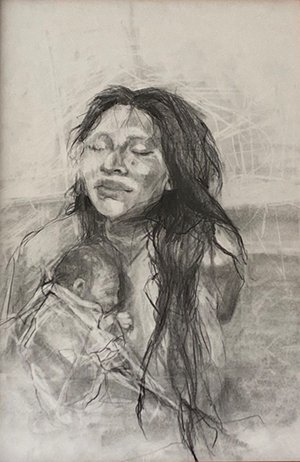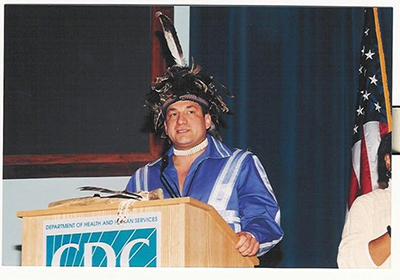URMC / Public Health Sciences / Indigenous Population Health
Indigenous Population Health: Focusing on Research and Data to Promote Health Equity
 Indigenous Peoples’ Day celebrates and honors Native American peoples and commemorates their histories and cultures. It began as a countercelebration held on the same day as the U.S. federal holiday Columbus Day. Many say Columbus Day glorifies an era of exploration that led to the genocide of native peoples and the loss of Indigenous ways of life. Today, we are still reckoning with systemic barriers that have deprived American Indians/Native Americans of their right to basic political, economic, and cultural rights, including health care.
Indigenous Peoples’ Day celebrates and honors Native American peoples and commemorates their histories and cultures. It began as a countercelebration held on the same day as the U.S. federal holiday Columbus Day. Many say Columbus Day glorifies an era of exploration that led to the genocide of native peoples and the loss of Indigenous ways of life. Today, we are still reckoning with systemic barriers that have deprived American Indians/Native Americans of their right to basic political, economic, and cultural rights, including health care.
Measuring Indigenous Health Disparities
According to the Center for Disease Control and Prevention (CDC), Indigenous people are disproportionately affected by many chronic conditions including heart disease, cancer, diabetes, and stroke, as well as
unintentional injuries (accidents). Indigenous people also have a high prevalence and risk factors for mental health issues and suicide, obesity, substance use, sudden infant death syndrome, teenage pregnancy, liver disease, and hepatitis.
The Impact of Incomplete Data
It’s difficult to address health disparities without accurate data, which is key to all research. While limited data on Indigenous population health is available nationally, it is absent in New York State and the Finger Lakes region. For example, when New York’s Office of Minority Health and Health Disparities Prevention published its most recent state health equity report in 2019, it only tracked the following races and ethnicities: white, Black, Asian/Pacific Islanders, and Hispanic.
Where data does exist, it is extremely limited and often not an accurate representation of American Indian/Native American health and health inequities. The Indian Health Service (IHS) collects data only from individuals residing on American Indian Reservations and is the only information that is used to inform health care practices for American Indian/Native Americans. It is troubling that no data is collected from urban American Indian/Native American people. The Office of Minority Health states that, according to the 2020 Census, 87 percent of those who identify as AI/AN live outside of tribal statistical areas and 13 percent live on reservations or other trust lands. Furthermore, IHS data is not tribe-specific, which is problematic because each tribe has a different form of tribal leadership, governance, access to potable water, economics, environmental concerns and language.
"Many of the challenges of data collection are exacerbated by historical trauma of past experiences with U.S. governance such as: broken treaties, genocidal practices, forced relocation off tribal nation lands, and having families shattered by mandating American Indian children be sent to residential boarding schools for assimilation into ‘American’ culture," said Camille A. Martina, PhD, research associate professor of Public Health and Environmental Medicine, and co-director of the Public Health Grand Rounds. "All these experiences have led to an understandable and general mistrust among Indigenous people of the data collection process and how that data would be used."
The most concerning impact of not having accurate or complete data to understand Indigenous population health is that the medical community does not know what health issues pose the greatest risk to Indigenous communities. In New York’s Finger Lakes region, we know lung, liver, and heart disease are problematic for Indigenous peoples, but which one is the worst? What about mental health issues resulting from the intergenerational trauma created by American Indian boarding schools? Knowing which issues most adversely impact people’s lives would lead to better health outcomes.
If, for example, we had complete and accurate data during the COVID-19 pandemic, health care professionals may have been able to respond to an uptick in cases and better protect American Indian/Native American communities on reservations. This is particularly important given the aerosol component to COVID-19 transmission and the risks associated with living in an overcrowded home, without access to running water, which is not uncommon in Indigenous reservation communities. COVID-19 has brought Indigenous health disparities into sharper focus. The CDC data shows that, compared to non-Hispanic whites, American Indians and Alaska Natives are nearly twice as likely to contract COVID-19, over three times as likely to be hospitalized for COVID-19 infection, and more than twice as likely to die from COVID-19.
 Working Toward Indigenous Health Equity
Working Toward Indigenous Health Equity
Despite the many challenges associated with Indigenous population health, the URMC Office of Health Equity Research remains optimistic that we can make significant progress toward health equity with a renewed focus on a few priorities.
First, we are exploring opportunities to get more involved in data collection at the state and regional level. Our goal is to reach a better understanding of how Indigenous health data is collected, who is collecting it, who owns it, and how it is analyzed and used.
Second, we are considering options such as partnering with other organizations to establish a “Center for Indigenous Health” at the URMC as an extension of the work we’re doing at the Office of Health Equity Research.
Finally, we continue to work alongside community partners who advocate for marginalized populations. For example, Common Ground Health is launching its Indigenous Health Coalition this fall. A small group of local Indigenous advocates will lead the coalition with support from Common Ground Health. URMC Adjunct Professor in Public Health Sciences, Dean Seneca, MPH, is working with Common Ground Health to build a strong coalition that makes a positive impact on the Greater Rochester community and beyond.
"Health equity means that everyone, no matter what race they are, how much money they have, or where they live, can have the best health possible," said Edith M. Williams, Ph.D., Founding Director of OHER. "The Office of Health Equity Research looks forward to expanding our efforts to understand Indigenous population health and advocating for systems change."
Please contact Dean_Seneca@URMC.Rochester.edu or Camille_Martina@URMC.Rochester.edu if you’d like to contribute to this work.
Written by Jonathan Ghent
Susanne Pritchard Pallo | 10/8/2023
Useful Resources
Federal Agencies
Organizations and Societies
Data sources on Native American/American Indian (NA/AI) health:
NA/AI Newsletters